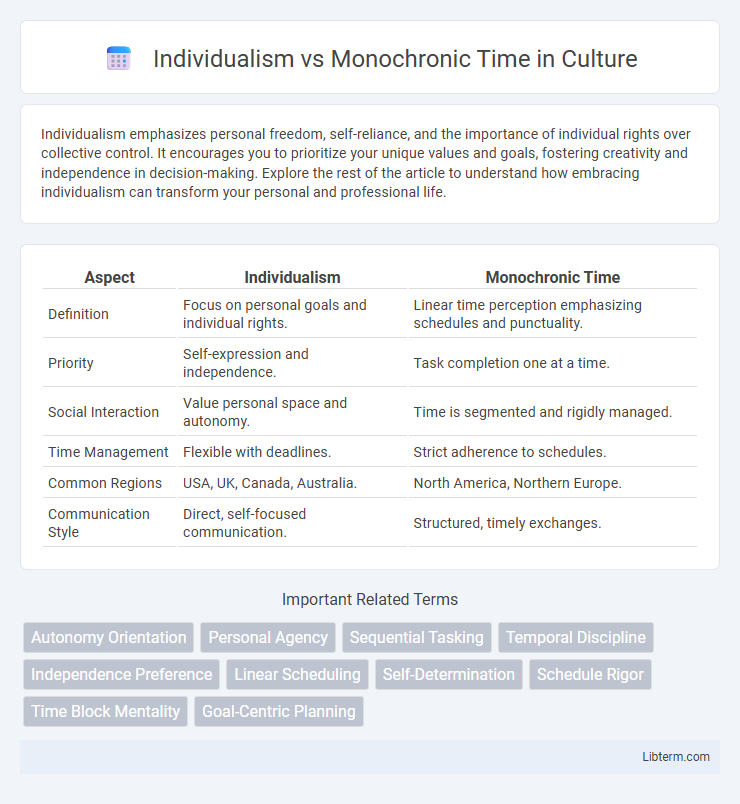Individualism emphasizes personal freedom, self-reliance, and the importance of individual rights over collective control. It encourages you to prioritize your unique values and goals, fostering creativity and independence in decision-making. Explore the rest of the article to understand how embracing individualism can transform your personal and professional life.
Table of Comparison
| Aspect | Individualism | Monochronic Time |
|---|---|---|
| Definition | Focus on personal goals and individual rights. | Linear time perception emphasizing schedules and punctuality. |
| Priority | Self-expression and independence. | Task completion one at a time. |
| Social Interaction | Value personal space and autonomy. | Time is segmented and rigidly managed. |
| Time Management | Flexible with deadlines. | Strict adherence to schedules. |
| Common Regions | USA, UK, Canada, Australia. | North America, Northern Europe. |
| Communication Style | Direct, self-focused communication. | Structured, timely exchanges. |
Understanding Individualism: Core Concepts
Individualism emphasizes personal autonomy, self-expression, and prioritizing individual goals over collective ones, fostering a culture where independence and personal achievement are highly valued. In monochronic time cultures, tasks are approached sequentially, valuing punctuality and schedules, which align with individualist traits of personal responsibility and time management. Understanding individualism involves recognizing how personal freedom and organized time structures combine to shape behavior and communication in these societies.
Defining Monochronic Time Orientation
Monochronic time orientation emphasizes scheduling, punctuality, and completing one task at a time, reflecting a linear and segmented approach to time management. Cultures with a strong monochronic orientation prioritize structure, deadlines, and adherence to plans, often valuing individual efficiency and organization. This time perception contrasts with polychronic orientations, where multitasking and fluid time boundaries dominate social and professional interactions.
Historical Roots of Individualism and Time Perception
Historical roots of individualism trace back to the Renaissance and Enlightenment periods in Western Europe, emphasizing personal autonomy, self-expression, and rationality. Monochronic time perception, characterized by a linear, segmented view of time, emerged alongside industrialization and the rise of clock-based scheduling in Western societies. This cultural evolution links individualism with a structured, punctual approach to time management, reflecting the prioritization of personal responsibility and task completion.
Individualism’s Influence on Time Management
Individualism significantly shapes time management by prioritizing personal goals, autonomy, and flexibility over strict schedules. In individualistic cultures, people often view time as a resource to be controlled and managed according to personal preferences, leading to a preference for monochronic time structures that emphasize punctuality and deadlines. This influence encourages self-directed time management strategies that maximize efficiency and personal productivity.
Monochronic Time: Structure and Scheduling
Monochronic time emphasizes strict structure and scheduling, where tasks are approached sequentially and punctuality is highly valued. In monochronic cultures, planning involves detailed agendas and clear deadlines to maintain efficiency and predictability. This time orientation supports focused productivity by minimizing interruptions and encouraging individuals to complete one task before moving to the next.
Workplace Dynamics: Individualism vs. Monochronic Cultures
Individualism in workplace dynamics emphasizes personal responsibility, autonomy, and self-motivation, driving employees to prioritize individual goals over group objectives. Monochronic cultures, characterized by strict adherence to schedules and sequential task management, value punctuality, deadlines, and focused work periods, which can affect collaboration styles and communication patterns. The intersection of individualistic values and monochronic time orientation often results in highly efficient, goal-oriented work environments where personal achievement aligns with structured time management.
Communication Styles and Time Awareness
Individualism emphasizes personal autonomy and direct communication styles, often valuing explicit verbal expressions to convey messages clearly. Monochronic time cultures prioritize punctuality and strict scheduling, revealing a structured approach to time awareness that influences communication by favoring concise, timely interactions. Differences in these dimensions affect how individuals negotiate, plan, and manage conversations, with individualistic cultures promoting personal viewpoints and monochronic cultures stressing efficiency and adherence to deadlines.
Challenges in Cross-Cultural Interactions
In cross-cultural interactions, individualism versus monochronic time poses challenges such as differing expectations on time management and personal autonomy. Individuals from monochronic cultures prioritize punctuality and sequential task completion, while those from individualistic cultures emphasize personal goals and flexible scheduling. These contrasting values can lead to misunderstandings, decreased collaboration, and inefficiencies in multinational teams.
Adapting Strategies for Global Collaboration
Adapting strategies for global collaboration requires understanding that individualistic cultures prioritize personal achievement and autonomy, often valuing flexibility over strict schedules. In contrast, monochronic time-oriented cultures emphasize punctuality, deadlines, and sequential task completion, demanding precise time management and structured processes in teamwork. Balancing these differences involves creating clear communication protocols and flexible timelines that respect cultural time perceptions while promoting productivity and mutual respect.
Future Trends: Evolving Perspectives on Time and Individualism
Future trends indicate a shift towards flexible time management, blending individualistic values with adaptable schedules that challenge traditional monochronic time structures. Digital transformation and remote work foster personalized time perceptions, promoting autonomy and efficiency over rigid punctuality. This evolution supports a cultural move towards valuing personal time boundaries while maintaining productivity in increasingly interconnected environments.
Individualism Infographic

 libterm.com
libterm.com